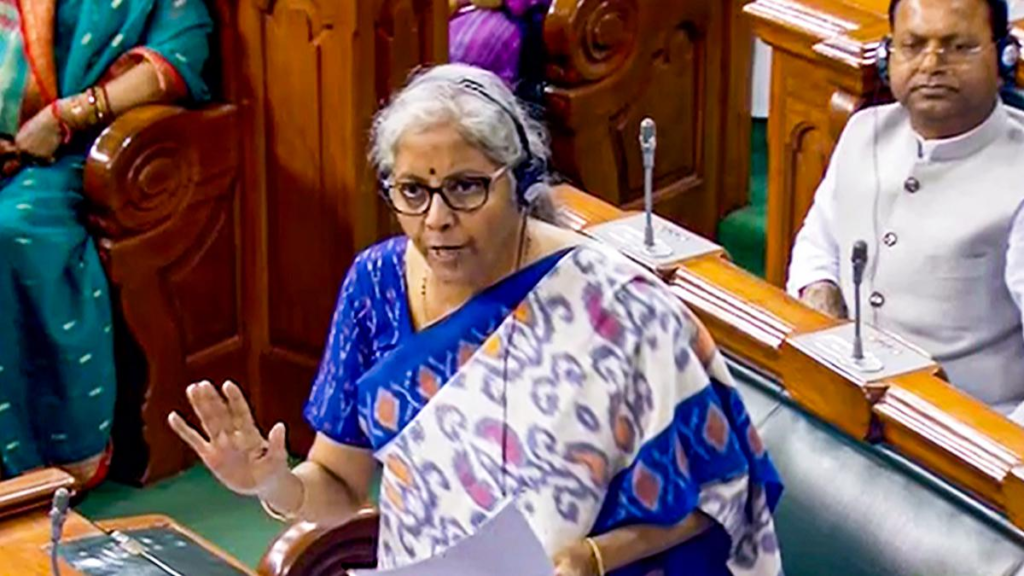To enjoy additional benefits
CONNECT WITH US
March 24, 2023 02:13 pm | Updated March 25, 2023 07:05 pm IST
COMMents
SHARE
READ LATER
Union Finance Minister Nirmala Sitharaman speaks in the Lok Sabha during Budget Session of Parliament, in New Delhi on March 24, 2023. | Photo Credit: PTI
The Finance Bill 2023 was been passed in Lok Sabha without a discussion and the House was adjourned to meet again on March 27.
Moving amendments to the Finance Bill, Nirmala Sitharaman said, “It has been represented that payments for foreign tours through credit cards are not being captured under the Liberalised Remittance Scheme (LRS) & they escape tax collection at source. The Reserve Bank of India is being requested to look into this with a view to bring credit card payments for foreign tours within the ambit of LRS and tax collection at source thereon.”
The withholding tax rate on royalties and fee for technical services paid to non-residents has been raised from 10% to 20%. “This may increase the cost of import of technology in cases where Indian companies are grossing up withholding taxes and any bilateral tax treaty benefits are not available,” said Gouri Puri, partner at Shardul Amarchand Mangaldas & Co.
The Finance Bill has paved the way for setting up GST Appellate Tribunals across the country, with a principal bench in New Delhi and several State benches. The Tribunal will be headed by a former Supreme Court judge or a retired Chief Justice of a High Court.
Also read: GST appellate tribunal may be headed by a former Supreme Court judge
The measure will have the intended effect of curbing excessive F&O trades only in flat or range-bound markets as when markets are volatile, traders will hope to offset the higher tax by higher payoffs, Mr. Jasani explained. “In the past, such raising of taxes had a temporary minimal impact of F&O volumes. For more effective curbs on volumes, SEBI or stock exchanges may have to link the volumes and Open interest in the futures and options market with the disclosed income or wealth of the participants,” the HDFC Securities official said.
“While the proposed increase in STT will shore up revenues of the Govt to a certain extent, the main idea behind this could be to discourage the excessive trade in F&O segment where a large number of retail traders end up losing money as per a recent SEBI study,” Deepak Jasani, head of retail research at HDFC Securities told The Hindu. “An incidental effect of this could be shifting the F&O trades to SGX, Gift and other locations that do not attract such taxes for participants who have access to them,” he added.
In a move that will assuage unit holders of REITs (Real Estate Investment Trusts) and InvITs (Infrastructure Investment Trusts), the government has tweaked the Budget proposal to tax distribution from business trust as income from other sources . “This is now proposed to be treated as return of capital by reducing the cost of acquisition of the units, as far as the issue price of the units. Any amount received in excess of the issue price would be taxable as income,” the Ministry explained.
While there have been no changes made to the Budget’s Angel Tax provisions for investments in startups, the Finance Ministry has said all concerns raised by stakeholders in implementation of this proposal would be addressed. “The draft rules related to valuation shall be shared with the stakeholders for their inputs in April itself, and exclusions, currently provided to domestic Venture Capital Funds etc, shall also be considered for similar overseas entities,” the Ministry assured.
This will impact all mutual funds that offer schemes with nomenclatures such as conservative hybrid funds, that invest predominantly in debt but have an equity exposure of up to 35% in their portfolios.
“An arbitrage is being created right now where interest income from debt mutual fund (where not more than 35% invested in shares in domestic company) is not distributed and converted into long term capital gains of 20% (with indexation). In some case it comes to even less than 10% due to indexation. Thus many taxpayers are able to reduce their tax liability through this arbitrage,” the Finance Ministry explained
Income from debt mutual funds that invest up to 35% in equity shares of domestic companies will be taxable at applicable rate since income from equities in such funds do not constitute interest income.
Also read: Government scraps long-term tax benefit for debt mutual funds investing less than 35% assets in equity
The Government is raising the Securities Transaction Tax (STT) on futures and options contracts in the stock market from April 1, 2023, and changes to this effect were brought into the Finance Bill cleared by the Lok Sabha today. Options contracts will now attract 0.021% STT from 0.017% earlier and futures will attract a levy of 0.0125%, up from 0.01%
COMMents
SHARE
budgets and budgeting / Union Budget / economy, business and finance
BACK TO TOP
Comments have to be in English, and in full sentences. They cannot be abusive or personal. Please abide by our community guidelines for posting your comments.
We have migrated to a new commenting platform. If you are already a registered user of The Hindu and logged in, you may continue to engage with our articles. If you do not have an account please register and login to post comments. Users can access their older comments by logging into their accounts on Vuukle.


